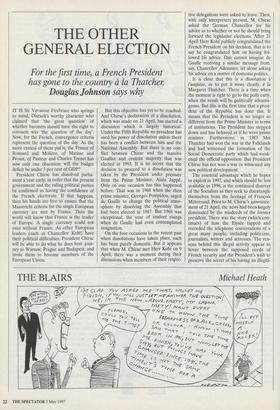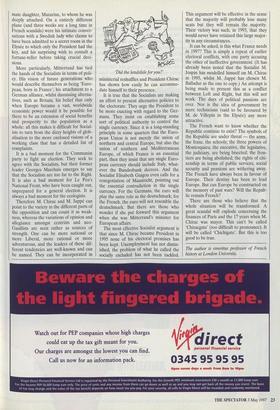THE OTHER GENERAL ELECTION
For the first time, a French President
has gone to the country a la Thatcher.
Douglas Johnson says why
IT IS Sir Vavasour Firebrace who springs to mind, Disraeli's worthy character who claimed that 'the great question' of whether baronets should have the right to coronets was 'the question of the day'. Now, for the French, convergence criteria represent the question of the day. As the more cynical of them put it, the France of Ronsard and Moliere, of Matisse and Proust, of Pasteur and Charles Trenet has now only one obsession: will the budget deficit be under 3 per cent of GDP?
President Chirac has dissolved parlia- ment a year early, in order that the present government and the ruling political parties be confirmed as having the confidence of the French electorate. If that happens, then his hands are free to ensure that the Maastricht criteria for the single European currency are met by France. Then the world will know that France is the leader of Europe. A single currency could not exist without France. As other European leaders (such as Chancellor Kohl) have their political difficulties, President Chirac will be able to do what he does best: jour- ney to Warsaw, Prague and Budapest, and invite them to become members of the European Union. But this objective has yet to be reached. And Chirac's declaration of a dissolution, which was made on 21 April, has started a discussion which is largely historical. Under the Fifth Republic no president has used his power of dissolution unless there has been a conflict between him and the National Assembly. But there is no con- flict between Chirac and the massive Gaullist and centrist majority that was elected in 1993. It is no secret that the decision to proceed to a dissolution was taken by the President under pressure from the Prime Minister, Alain Juppe. Only on one occasion has this happened before. That was in 1968 when the then prime minister, Georges Pompidou, urged de Gaulle to change the political atmo- sphere by dissolving the Assembly that had been elected in 1967. But 1968 was exceptional, the year of student risings when de Gaulle had even contemplated resignation.
On the four occasions in the recent past when dissolutions have taken place, each has been purely domestic. But it appears that when M. Chirac met Herr Kohl on 9 April, there was a moment during their discussions when members of their respec- tive delegations were asked to leave. Then, with only interpreters present, M. Chirac asked the German Chancellor for his advice as to whether or not he should bring forward the legislative elections. After 21 April Herr Kohl publicly congratulated the French President on his decision, that is to say he congratulated him on having fol- lowed his advice. One cannot imagine de Gaulle receiving a similar message from, say, Chancellor Adenauer, let alone asking his advice on a matter of domestic politics.
It is clear that this is a dissolution a l'anglaise, or to put it more clearly, a la Margaret Thatcher. There is a time when the moment is right to go to the polls early, when the result will be politically advanta- geous. But this is the first time that a presi- dent of the Republic has done this. It means that the President is no longer so different from the Prime Minister in terms of institutions. The President has stepped down and has behaved as if he were prime minister. Furthermore, in 1983 Mrs Thatcher had won the war in the Falklands and had witnessed the formation of the Social Democratic party which had weak- ened the official opposition. But President Chirac has not won a war or witnessed any new political development.
The essential advantage which he hopes to exploit in 1997, and which should be less available in 1998, is the continued disarray of the Socialists as they seek to disentangle themselves from the heritage of Francois Mitterrand. Prior to M. Chirac's announce- ment of 21 April, the news had been largely dominated by the misdeeds of the former president. There was the story (which con- tinues) of how the Elysee tapped and recorded the telephone conversations of a great many people, including politicians, journalists, writers and actresses. The rea- sons behind this illegal activity appear to hover between the supposed needs of French security and the President's wish to preserve the secret of his having an illegiti- mate daughter, Mazarine, to whom he was deeply attached. On a entirely different plane (and three weeks are a long time in French scandals) were his intimate conver- sations with a Swedish lady who claims to have been admitted to a secret room in the Elysee to which only the President had the key, and his surprising wish to consult a fortune-teller before taking crucial deci- sions.
More particularly, Mitterrand has tied the hands of the Socialists in terms of poli- cy. His vision of future generations who would describe themselves as being 'Euro- pean, born in France'; his attachment to a German alliance, whilst dismissing alterna- tives, such as Britain; his belief that only when Europe became a vast, worldwide economic power would it be possible for there to be an extension of social benefits and prosperity to the population as a whole: all this makes it difficult for Social- ists to turn from the dizzy heights of glob- alisation to the more enclosed visions of a working class that has a detailed list of complaints.
It is a bad moment for the Communist party to fight an election. They seek to agree with the Socialists, but their former leader Georges Marchais emerges to say that the Socialists are too far to the Right. It is also a bad moment for Le Pen's National Front, who have been caught out, unprepared for a general election. It is always a bad moment for the ecologists.
Therefore M. Chirac and M. Juppe can point to the variety in the different parts of the opposition and can count it as weak- ness, whereas the variations of opinion and allegiance amongst centrists and neo- Gaullists are seen rather as sources of strength. One can be more national or more Liberal, more rational or more adventurous, and the leaders of these dif- ferent tendencies are well-known and can be named. They can be incorporated in Did the landslide for you?'
ministerial reshuffles and President Chirac has shown how easily he can accommo- date himself to their presence.
It is true that the Socialists are making an effort to present alternative policies to the electorate. They urge the President to be more exacting with regard to the Ger- mans. They insist on establishing some sort of political authority to control the single currency. Since it is a long-standing principle in some quarters that the Euro- pean Union is not merely the union of northern and central Europe, but also the union of southern and Mediterranean Europe, of which France is an essential part, then they insist that any single Euro- pean currency should include Italy, what- ever the Bundesbank decrees. And the Socialist Elisabeth Guigou even calls for a renegotiation of Maastricht, pointing out the essential contradiction in the single currency. For the Germans, the euro will play the same role as the deutschmark; for the French, the euro will not resemble the deutschmark. But there are those who wonder if she put forward this argument when she was Mitterrand's minister for European affairs. The most effective Socialist argument is that since M. Chirac became President in 1995 none of his electoral promises has been kept. Unemployment has not dimin- ished, the problem of what he called the socially excluded has not been tackled. This argument will be effective in the sense that the majority will probably lose many seats but they will remain the majority. Their victory was such, in 1993, that they would never have retained this large major- ity in any circumstances.
It can be asked, is this what France needs in 1997? This is simply a repeat of earlier electoral conflicts, with one party accusing the other of ineffective government. (It has already been noted that the Socialist M. Jospin has modelled himself on M. Chirac in 1995, whilst M. Juppe has chosen M. Balladur as the one to copy.) An attempt is being made to present this as a conflict between Left and Right, but this will not work. The days of political passions are over. Nor is the idea of government by mere technicians (said to be favoured by M. de Villepin in the Elysee) any more attractive.
The French want to know whether the Republic continue to exist? The symbols of the Republic are under threat — the army, the franc, the schools; the three powers of Montesquieu, the executive, the legislative, the judiciary, are being bisected; the fron- tiers are being abolished; the rights of citi- zenship in terms of public services, social security and pensions are withering away. The French have always been in favour of Europe. Their destiny has been to lead Europe. But can Europe be constructed on the memory of past wars? Will the Repub- lic remain French?
There are those who believe that the whole situation will be transformed. A great scandal will explode concerning the finances of Paris and the 17 years when M. Chirac was mayor. This can't be called `Chiracgate' (too difficult to pronounce). It will be called `Chichigate'. But this is too good to be true.
The author is emeritus professor of French history at London University.



































































 Previous page
Previous page